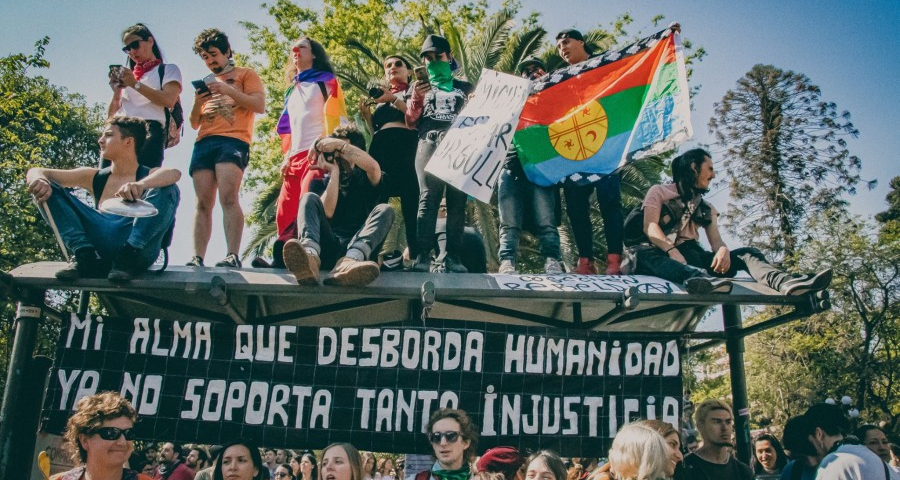The causes of the ongoing protests in Chile have a lot to do with the indiscriminate and short-sighted exploitation of the country’s natural resources by international corporations that, in order to maximize their profits, have generated great inequalities leaving an entire people on their knees. Here is a heartfelt letter from a Chilean to her country.
By Alejandra Vásquez Alvarado
My dear Chile, you are a group of people who are very different but also very similar to each other. I am writing to you today thinking about what we have in common.
We are all embraced by the same immense Cordillera or Andes Mountain range, we share the same vast ocean, we breathe the same air and the sun rises for everyone at the same time. The resources on which our Gross Domestic Product is based, come largely from the Cordillera, where great resources of copper, lithium and water resources are found... a great variety of fruits grow on Chilean soil, every good Chilean citizen worth his salt is especially fond of the avocado, but there are also beans, grapevines ... In the ocean that bathes the long coast of Chile there is a wealth of eels, clams, crabs, and salmon swimming against the tide, large quantities of tuna in the waters surrounding Easter Island, and many other kinds of fish.
So what happened in recent years?
The ocean floor has been systematically polluted, due to - for instance - the antibiotics systematically provided to the salmon farms, eventually causing the disappearance of a large part of the endemic fauna and seriously compromising artisanal fishing. Our sea is being licensed to large companies and the majority of our fish is sold abroad.
The production of minerals is experiencing the same development: the concessions for mining are in the hands of international consortia, which are depleting natural resources while releasing contaminated water. The exploitation and production of minerals also generates large "sacrificed areas", where the inhabitants often suffer from serious diseases caused by the pollution affecting these exploited areas.
Not to mention the scarcity of water, a resource entirely controlled by a restricted group of people who do not care for or think of the common good. The avocado cultivated with this water is exported, leaving Chileans without avocados while also restricting the water available to those who live in these territories, making it impossible for them to irrigate and making farm animals die of thirst.
The same can be said for the reduction in the waters flowing in the rivers, as in the case of the historic river Biobío, which has its sources in the original territory of the indigenous Mapuche people - in the Galletue Lagoon and Lake Icalma. This river is one of the longest rivers in Chile (360 km), the Mapuche call it Butanleuvu (the Great River). Today, however, only a rivulet flows into the city of Concepción, its waters having been greatly reduced in recent years due to abundant pine and eucalyptus plantations. These endogenous plants absorb water in depth, contributing to erode the soil: soon, we will have a desert not only in the north of Chile, but in the southern part of the country as well.
We find ourselves increasingly separated and alienated as people too: many do not have a decent salary and struggle to survive day by day, which has led to a constant and anguishing increase in debts. The debt rate has expanded to other social classes and groups, it is estimated that between 70% and 80% of the population is indebted for various reasons today: for subsistence or appearance, for reasons of status or for the suffocating influence of advertising. Whatever the cause, everyone has exorbitantly high levels of debt in common, which makes it virtually impossible to live peacefully under the same sky watching over us all.
People live in anguish and fear of tomorrow, and this generates social diseases such as stress and depression, stemming from a general sense of frustration and defeat. All this is further exacerbated by the inefficiency of public services, which lack the financial resources required to, for example, guarantee health services that can help to alleviate this general pain.
We do not have access to care services for the elderly, who therefore have no choice but to continue working, since the pension funds (AFP) are nowhere near sufficient enough to meet their basic needs and the jobs most carry out only make their health situation worse.
These are just a few of the wounds we are experiencing as a society today.
We trust that we will be able to move forward, with real proposals that know how to take care of our land and of our people. We are still in time to save and take care of what remains. We want a real and non-extractive development, worthy jobs and decent salaries, a sustainable development and not philanthropy turned into advertising. We want to take our situation today and the future of our children and of the generations to come all into consideration. We love our land and we want to see it evolve in harmony, to be able to shout at the top of our lungs: long live Chile!
Photo credits: @sineditar1








